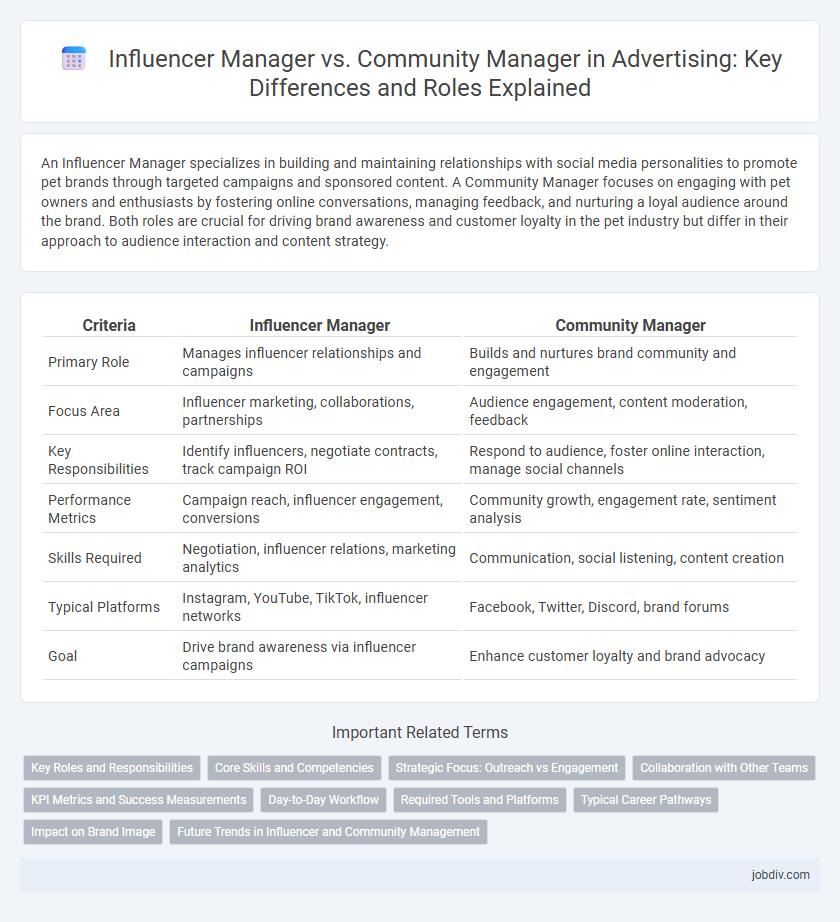An Influencer Manager specializes in building and maintaining relationships with social media personalities to promote pet brands through targeted campaigns and sponsored content. A Community Manager focuses on engaging with pet owners and enthusiasts by fostering online conversations, managing feedback, and nurturing a loyal audience around the brand. Both roles are crucial for driving brand awareness and customer loyalty in the pet industry but differ in their approach to audience interaction and content strategy.
Table of Comparison
| Criteria | Influencer Manager | Community Manager |
|---|---|---|
| Primary Role | Manages influencer relationships and campaigns | Builds and nurtures brand community and engagement |
| Focus Area | Influencer marketing, collaborations, partnerships | Audience engagement, content moderation, feedback |
| Key Responsibilities | Identify influencers, negotiate contracts, track campaign ROI | Respond to audience, foster online interaction, manage social channels |
| Performance Metrics | Campaign reach, influencer engagement, conversions | Community growth, engagement rate, sentiment analysis |
| Skills Required | Negotiation, influencer relations, marketing analytics | Communication, social listening, content creation |
| Typical Platforms | Instagram, YouTube, TikTok, influencer networks | Facebook, Twitter, Discord, brand forums |
| Goal | Drive brand awareness via influencer campaigns | Enhance customer loyalty and brand advocacy |
Key Roles and Responsibilities
An Influencer Manager specializes in identifying, negotiating, and maintaining partnerships with influencers to amplify brand visibility and drive targeted campaigns. A Community Manager focuses on building and nurturing online brand communities through engagement, content moderation, and feedback collection to foster loyalty and enhance customer experience. Both roles require strategic communication skills, but the influencer manager emphasizes external collaborations, while the community manager prioritizes direct interaction with the brand's audience.
Core Skills and Competencies
Influencer Managers excel in relationship building, negotiation, and analytics to identify and collaborate with key digital personalities for targeted campaigns. Community Managers specialize in content creation, audience engagement, and social listening to foster brand loyalty and manage online communities effectively. Both roles require strong communication skills, but Influencer Managers focus on external partnerships while Community Managers prioritize direct interaction with the brand's audience.
Strategic Focus: Outreach vs Engagement
Influencer Managers prioritize strategic outreach by identifying and collaborating with key influencers to amplify brand messages and expand audience reach. Community Managers focus on engagement by fostering meaningful interactions and nurturing relationships within the brand's existing audience to boost loyalty and retention. Both roles require tailored approaches to maximize brand presence, with outreach driving growth and engagement sustaining long-term community value.
Collaboration with Other Teams
An Influencer Manager collaborates closely with marketing, PR, and content creation teams to align influencer campaigns with brand goals and ensure consistent messaging across platforms. A Community Manager works alongside customer support, social media, and product teams to nurture user engagement, gather feedback, and enhance community experience. Both roles require seamless cross-functional communication to optimize campaign effectiveness and audience connection.
KPI Metrics and Success Measurements
Influencer Managers prioritize KPIs such as engagement rates, follower growth, and conversion metrics from influencer campaigns, directly attributing ROI to influencer partnerships. Community Managers focus on metrics like community growth, sentiment analysis, member retention, and activity rates within brand-owned platforms to gauge brand loyalty and long-term engagement. Success for Influencer Managers is measured by campaign reach and lead generation, while Community Managers emphasize sustained user interaction and brand advocacy metrics.
Day-to-Day Workflow
Influencer Managers coordinate campaigns by identifying key influencers, negotiating contracts, and monitoring content performance to drive brand awareness and sales. Community Managers engage directly with audiences through social media platforms, responding to comments, fostering brand loyalty, and managing user-generated content to maintain a vibrant online presence. The day-to-day workflow of Influencer Managers centers on strategic partnerships, while Community Managers focus on real-time audience interaction and community growth.
Required Tools and Platforms
Influencer managers predominantly utilize platforms like AspireIQ, Upfluence, and Traackr to identify, track, and manage influencer partnerships, ensuring effective campaign performance analysis. Community managers rely heavily on tools such as Hootsuite, Sprout Social, and Discord to engage with audiences, moderate conversations, and foster brand loyalty across social media and online forums. Both roles leverage analytics platforms like Google Analytics and Brandwatch to measure engagement metrics and optimize their respective strategies.
Typical Career Pathways
Influencer Managers typically advance from roles in digital marketing or brand partnerships, focusing on strategic collaboration with social media personalities to boost brand visibility and engagement. Community Managers often start in customer service or content creation, evolving their expertise toward fostering brand loyalty and moderating user interaction within online communities. Both career paths demand strong communication skills, but Influencer Managers emphasize negotiation and campaign analytics, while Community Managers prioritize engagement metrics and community growth strategies.
Impact on Brand Image
Influencer Managers strategically collaborate with influential personalities to amplify brand visibility and shape public perception through authentic endorsements. Community Managers cultivate direct engagement within brand communities, fostering loyalty and trust that enhance the overall brand image. Both roles impact brand reputation, with Influencer Managers driving external awareness and Community Managers strengthening internal brand relationships.
Future Trends in Influencer and Community Management
Future trends in influencer and community management emphasize integrated strategies leveraging AI-driven analytics for personalized engagement and predictive insights. Influencer managers will increasingly focus on data-centric influencer identification and ROI measurement, while community managers prioritize fostering authentic interactions through real-time feedback loops and decentralized platforms. The convergence of these roles will drive seamless brand storytelling, enhanced customer loyalty, and improved campaign performance in evolving digital ecosystems.
Influencer Manager vs Community Manager Infographic

 jobdiv.com
jobdiv.com